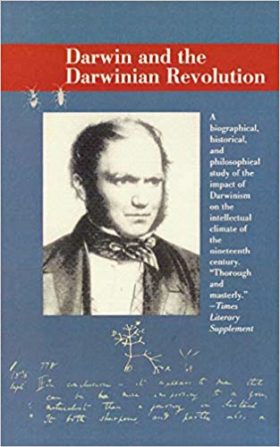 Evolution
Evolution
Farewell to Gertrude Himmelfarb, Brutally Honest Historian of the “Darwinian Revolution”


Historian Gertrude Himmelfarb died at her home on Monday evening, December 30, 2019. For readers of Evolution News, her real magnum opus remains Darwin and the Darwinian Revolution, first published in 1959, revised in 1962, and not only still in print today but available online.
At her passing, she was 97 years old. Born in Brooklyn to Russian Jewish parents, she met her future husband, Irving Kristol, when she was 18 at a Trotskyist anti-Soviet meeting. Irving and other enfant terribles of that generation found moorings with the neo-conservative movement. Married in 1942, Bea, as she was affectionately known to her family, never took Irving’s name. (He passed away in 2009.) This Brooklyn College graduate earned a fellowship to the University of Chicago, and after World War II went on to spend a year at Cambridge where she edited the work of Lord Acton and published her dissertation, “Lord Acton: A Study in Conscience.”
A Scholar of the First Rank
All of her writing career Dr. Himmelfarb was devoted to careful investigations of Victorian society, morals, and virtues as exemplified in certain eras, and important figures such as Edmund Burk, Oliver Cromwell, Winston Churchill, George Eliot, and others. Himmbelfarb retained her ability to write perceptively and compassionately about people and issues that mattered to her. In one of her last books, The People of the Book (2011), about England’s Jews and the Jewish state, philo-Semitism is the word she uses to express the distinctly English sense of fair play and live-and-let-live attitudes that not only paid dividends to Jews but ultimately gave equality to nonconformist Protestants, Catholics, and English women. Such tolerance has been a win-win in English life.
A consummate scholar of the first rank, Dr. Himmelfarb was Fellow of the British Academy, Fellow of the American Academy of Arts and Sciences, Fellow of the Royal Historical Society, and served on the Council of the National Endowment for the Humanities in the 1980s, Council of Scholars of the Library of Congress until 2008 for nearly a quarter century (she was seriously considered for the position of Librarian of Congress in 1987, a measure of her significance as one of America’s leading scholars and intellectuals), Board of Trustees of the Woodrow Wilson Center (1985–96), and Council of Academic Advisors of the American Enterprise Institute (1987–present). In 1991 she gave the prestigious Jefferson Lecture, and in 2004 received the National Humanities Medal.
Darwin’s Revolution
 I will here add a few comments on her monumental book, Darwin and the Darwinian Revolution, noted at the outset. I think it continues to tower over Whiggish studies of Darwin such as Daniel Dennett’s Darwin’s Dangerous Idea, an odd reveling in reductionist acidic poison; David Quammen’s The Reluctant Mr. Darwin, an innocuous and uninteresting antidote to Dennett’s baneful brew; and even Janet Browne’s massive two-volume biography Charles Darwin: Voyaging and Charles Darwin: The Power of Place, a scholarly recounting of minutiae that leaves the reader wanting to know more. One could save money and shelf space by forgoing all these for Himmelfarb’s book.
I will here add a few comments on her monumental book, Darwin and the Darwinian Revolution, noted at the outset. I think it continues to tower over Whiggish studies of Darwin such as Daniel Dennett’s Darwin’s Dangerous Idea, an odd reveling in reductionist acidic poison; David Quammen’s The Reluctant Mr. Darwin, an innocuous and uninteresting antidote to Dennett’s baneful brew; and even Janet Browne’s massive two-volume biography Charles Darwin: Voyaging and Charles Darwin: The Power of Place, a scholarly recounting of minutiae that leaves the reader wanting to know more. One could save money and shelf space by forgoing all these for Himmelfarb’s book.
She presents a complete and honest portrayal of Darwin and his theory, and her points are compelling. Not the least of those is that far from constructing sound empirical arguments, Darwin usually engaged in rhetorical sleight-of-hand where “possibilities were promoted into probabilities, and probabilities into certainties, so ignorance itself was raised to a position only once removed from certain knowledge” (p. 335). Few, except perhaps Jacques Barzun in his Darwin, Marx, Wagner: Critique of a Heritage (originally published 1941), have been so brutally honest.
A Warning Against Scientism
It is comforting to know that Himmelfarb never lost her intellectual acuity or her moral passion on the subject. When asked to review E.O. Wilson’s edits of Darwin’s four great works in From So Simple a Beginning and James D. Watson’s Darwin: The Indelible Stamp for The New Republic (December 12, 2005) she wrote an insightful essay, “Monkeys and Morals,” and was reminded of being introduced to Julian Huxley (grandson of Darwin’s bulldog, Thomas Henry Huxley, then Darwin’s faithful puppy) in 1958 at a cocktail party on the eve of her book’s publication. When Gertrude suggested to Julian that her book might shed new light on Darwinian evolution, he immediately protested, “New! There is nothing new to say about evolution. Everything that needs saying has already been said. The theory is incontrovertible.” She says that abruptly ended the conversation. Huxley marched off for better company. How little things have changed! And indeed Dr. Himmelfarb must have had déjà vu as she reviewed Wilson and Watson’s books. She wrote:
The editors of these new editions of Darwin may have taught us more than they know. A non-scientist may well stand in awe of the enormous achievements that they as individuals, and scientists in general, have to their credit. They have learned a great deal, and we have learned a great deal from them. But what they have evidently not learned is humility — an appreciation of the limits of science, of what science does not know and cannot know.
She concluded her review warning of our rapid descent into scientism, “for it is not only science that is now presumed to be the only access to truth, but also the subcategory of science known as Darwinism.”
I, for one, will miss Gertrude Himmelfarb for her razor-sharp logic, her penetrating analyses of great figures in history, raising them up to high regard and eminence when called for and cutting them down to size where necessary, and most of all for her fearless and uncompromising commitment to truth in history. We need more like her in this world. She will be missed, but her insightful mind will be with us still.
David Berlinski once observed that Darwin’s “admirers have over the past twenty years or so succeeded in suggesting that his effulgence was such that had he been embedded in the ocean floor, sailors might for centuries unerringly navigate by his luster” (The Devil’s Delusion, p. 186). But I’d prefer not to sail toward that terra incognita. Darwin’s directing light is not a beacon of wisdom and comfort; it is a Siren’s lure of confusion and destruction. For me, Gertrude Himmelfarb has provided enough light on the Down House demigod to set my sails confidently for more certain lands. Shine on Dr. Himmelfarb!
Photo: Gertrude Himmelfarb on Booknotes, with Brian Lamb, in 1995 via YouTube (screenshot).
